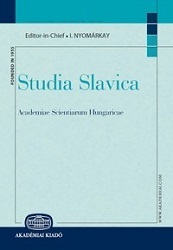Еміль Балецький – дослідник закарпатських українських говорів (другий етап наукової діяльності). До 100-річчя від дня народження
Emil Baleczky – a Researcher of Transcarpathian Ukrainian Dialects (the Second Stage of his Professional Carrier). To his 100th Birthday
Author(s): Erzsébet BáránySubject(s): Lexis, Historical Linguistics, Sociolinguistics, Eastern Slavic Languages
Published by: Akadémiai Kiadó
Keywords: Emil Baleczky; language contacts; lexical borrowings; Transcarpathian Ukrainian dialects; Hungarian loanwords; Slavic loanwords; etymology; University of Budapest;
Summary/Abstract: Emil Baleczky (his pseudonyms: E. Latorchanin, O. Vyshchak, and his cryptonym: E. A.) is one of the most prominent personalities in the history of Ukrainian studies in Hungary in the twentieth century. His main scientific interests include Transcarpathian dialectology and historical lexicology of the Ukrainian language. The second stage of the scientist’s professional carrier is connected with the University of Budapest, where in 1951, Emil Baleczky was appointed head of the Department of the Russian Language at the Institute of Foreign Languages, and at the same time assistant professor of the Russian Institute at the University. Among the scientific interests of Emil Baleczky was the investigation of lexical units commonly used in Transcarpathia, first of all, in terms of their etymology. Among the achievements of the researcher, special attention must be paid to Emil Baleczky’s attempt to determine the origin of some borrowed words, including those originally Slavic, which are common in the Carpathian Ukrainian dialects. Emil Baleczky performed a deep etymological and lingual-geographical analysis of the word урик, урюк, орек in the Ukrainian language, that of the word дюг widespread in Precarpathian Ukrainian, Polish, and Slovakian dialects, and also that of the noun kert in Transcarpathian Ukrainian dialects. The author devoted a separate paper to the study of the origin of dialecticisms like фотляк, csulka ~ csurka, бôшн’ак, булґар’, валах, ґириґ, тôўт, and циганин, investigated the etymology of the terms of national dishes widespread in Carpathian Ukrainian dialects, in particular of the token бáник. He considered the role of the Old Church Slavonic language in the history of the Carpathian Ukrainian dialects. According to his contemporaries, it is known that Emil Baleczky did not maintain official connections with the Soviet Transcarpathians but was surprisingly well-informed about the scientific processes in his native land. He analyzed the works contained in the two editions of the Dialectological Collection of Uzhgorod State University. In addition to examining the issues raised, Baleczky complemented, specified, and sometimes criticized the achievements of his colleagues, which indicates his deep knowledge of Transcarpathian Ukrainian dialectology. Thus, we can state that Emil Baleczky’s works testify the high professionalism of the author, his profound knowledge in the field of synchronic and diachronic dialectology. The love of Transcarpathian dialects inspired the researcher to study them thoroughly as well as to present the research results to the general public of Slavists. The main area of Emil Baleczky’s scientific interest until the end of his life was Ukrainian linguistics, particularly Transcarpathian Ukrainian dialectology. The aim of this paper is to present the Emil Baleczky’s achievements in the field of Transcarpathian Ukrainian dialectology, focusing on the period from 1957 to 1979.
Journal: Studia Slavica Academiae Scientiarum Hungaricae
- Issue Year: 64/2019
- Issue No: 1
- Page Range: 13-26
- Page Count: 14
- Language: Ukrainian
- Content File-PDF

